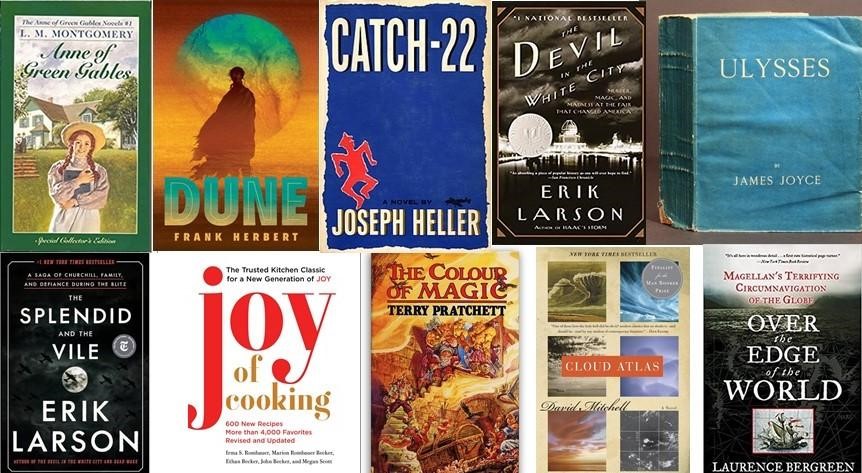The UMB Post[doc]
September 2021
Can You Match Faculty Members and OPS Staff with Their Favorite Books?
Introduction
Dear Readers,
Welcome to September 2021. This month we celebrate Postdoc Appreciation Month with a literary theme. You can read about the benefits of a lifetime of reading and try to match faculty and OPS staff up with their favorite books.
If you would like to be involved in the making of the newsletter, shaping the content we share or being a guest interviewee or contributor, please reach out to us at: rcockerham@som.umaryland.edu.
We wish you a wonderful month!
The UMB Post[doc]
Of Books and Men
Ganna Galitska Metzger

What comes to mind when you hear the words “an interesting book” or “reading a book”? Ask your friends and yourself. Have you imagined an old folio from your grandparent’s bookcase, an ancient tome on a dusty library shelf, a new bestseller in a shiny cover everyone talks about, or your favorite book waiting for you at home? Have you imagined reading it wrapped in a blanket, in your favorite chair, in a park, or maybe at the beach, anticipating the feeling of diving into your own imagination? When was the last time you enjoyed reading a very engaging piece?
Books play a quintessential role in every possible aspect of life from before we can even read ourselves all the way through old age by boosting our memory and vocabulary, improving our reading, writing and speaking skills, and providing knowledge and facts of the outside world. Throughout the world, life chances are shaped by education. According to the One World Literacy Foundation, a person who can read can educate themselves in any area of life they’d like.
The importance of reading in our life cannot be overstated, for it not only helps in broadening our horizons but also acts as doorways connecting us with the world around us and sometimes even functions as a survival kit. In an age that is overflowing with new information, especially considering the current world situation and disinformation campaigns spreading false information or data that is too often inconsistent, contradictory, or redundant, reading, and more importantly critical reading, is the best way to rationalize and relate to the truth.
And again, in search of truth, what does science say regarding the impact of reading?
Early age readers
It is well accepted that reading books from an early age benefits young readers later in their lives, reflected in higher academic grades and educational achievements. Multiple social and cognitive studies confirm such opinions. For instance, several extensive studies indicate that children who grew up surrounded by heavy bookshelves in a so-called scholarly culture - homes in which the way of life involves esteeming, reading, and enjoying books – display higher educational performance in comparison to those growing up around very few books or none. The number of books in the family home exerts a strong influence on academic performance, regardless of national ideology, political history, or level of development in every one of the 42 nations studied [1]. The evaluation tests in the studies were carefully designed and structured to minimize class and ethnic bias, including accounting for parents’ occupations, education level and family wealth. Interestingly, the studies also rebut critics who contend that having books in the home “merely signals children’s elite status to gatekeepers, who then grant them unjust advantages.” On the contrary, the studies emphasize that books especially benefit children from disadvantaged families. The intellectual environment at home is reflected in student school performance, granting those with a home book collection an enormous advantage. Growing up with an estimated 500 books at home propels a child 3.2 years further in education than growing up in a similar home with few or no books [2].
Of course, one may argue that correlation does not necessarily indicate causation. It is important to mention that because the presence of books is correlated to a child’s academic achievement does not mean that the books themselves are the key. A more likely scenario is that the families who have lots of books are communicating that they value reading and learning. Therefore, their children are exposed to the thoughts and the values that parents propagate. Since children learn most by the actions and attitudes which parents model, their readily observable high valuation of books is successfully shared and passed on.
Reading daily to children at age 4-5 has a significant positive effect on their reading skills and cognitive skills, such as language [3], literacy, numeracy [4], and cognition later in life. Reading to children 3-5 days per week (compared to 2 or less) has the same effect on the child’s reading skills at age 4-5 as being six months older. Reading to them 6-7 days per week has the same effect as being almost 12 months older. Children that are read to more frequently at age 4-5 go on to achieve higher scores on the National Assessment Program – Literacy and Numeracy (NAPLAN) tests for both Reading and Numeracy in Year 3 (age 8 to 9) [5]. These differences in reading and cognitive skills are not related to the child’s family background or home environment but rather are the direct result of how frequently they have been read to prior to starting school.
Another study, out of many, revealed that children who read high-quality books daily tested higher than their peers who either did not engage in reading or opted for magazines or comic books. The researchers had 43,000 children between the ages of 10 and 11, and then again when they were 13 to 14, participate in the study. The participants and their parents completed questionnaires that assessed the children’s typical reading habits, their attitudes towards reading and school, the parents’ feelings about reading, and how often parents read. The researchers found that the increase in test scores matched an additional three months’ worth of formal schooling, which may ultimately benefit children as they continue through their studies. Additionally, reading regularly also boosted kids’ test scores in math, as they showed similar levels of progress on math exams [6].
In an era of electronic entertainment, the term “home library” increasingly starts to refer to the word “video” in the middle. But before parents start giving up on books to clear shelf space for DVDs, they should consult the recent results of Her Majesty Science.
Adult readers
It is not just children that benefit from reading. Reading is one of the best forms of self-education for adults too, however, less complex and less engaging forms of reading are unlikely to bring the same benefits for their cognitive development. While it may be easy to watch a YouTube video or listen to a podcast, reading still holds precedence when it comes to comprehension, improving your concentration, expanding your vocabulary (a process referred to as the Matthew effect) [7], and communication skills. Numerous books written in several genres such as fiction, non-fiction, drama, thriller, suspense, science-fiction, come with their own unique perspective. An avid reader gets to create his/her own perspective, gains an advantage at analyzing different environments, and develops immense observational skills. Sometimes, reading may assist one to develop empathy: engaging with fictional characters and situations has a strong impact on one’s capacity to empathize with people, overall promoting social perception and emotional intelligence [8].
Numerous studies have shown that reading is associated with improved brain functioning [9 ], and increases longevity in old age [10]. In addition, reading is also associated with decreased odds of having MCI (mild cognitive impairment) [11].
Another interesting research conducted at Yale University School of Public Health found that a 20% reduction in mortality was observed for those who read books, compared to those who did not read books [12]. Good news for those bookworms: the longer they live, the more time they have to get through their to-be-read pile.
Reading habits have also been associated with reduced tension and stress levels, improving overall well-being. A study from the University of Turin on the use of books as therapy in the treatment of mental or psychological disorders demonstrated significant improvements in patients’ overall wellbeing for up to three years after partaking in a course of reading therapy [13]. Interestingly, another research study carried out by Mindlab International at the University of Sussex in 2009 showed that after only six minutes of reading a book, the subjects’ stress levels were reduced by 68% compared to performing other activities such as listening to music (stress levels reduced by 61%) or taking a walk (stress levels reduced by 42%).
In light of these facts, the old-fashion advice “Read a book!” becomes not offensive so much as sage advice.
Most of all, reading is pleasurable! When one starts to read a really good book, it is often hard to put it down, the story captivates, and time disappears as one becomes absorbed. Upon reaching the end, one feels sad because it is over. Does that sensation sound familiar? Welcome to the life-long bookworm club! It is once and forever.
Postdoc Accolades

Photo by Jason Dent on Unsplash
Erin Roth, a postdoc in the Pharmaceutical Health Services Research department in the School of Pharmacy, has published a paper entitled “Affective Practices of Diabetes Self-Management Among Older Adults: Cumulative Effects of Childhood Adversity” in the journal Gerontologist. doi: 10.1093/geront/gnab124.
Awadhesh Arya, a postdoc in the Shock, Trauma & Anesthesiology Research Center, has published a paper entitled " Focal intra-colon cooling reduces organ injury and systemic inflammation after REBOA management of lethal hemorrhage in rats” in the journal Scientific Reports. doi: 10.1038/s41598-021-93064-4.
Sarah Keefer, a postdoc in the Department of Anatomy and Neurobiology, won the 2nd Annual Dr. Michael Shipley Award given by the Program in Neuroscience.
September and October Events
Sixth Annual Postdoc Retreat
September 10 - Selecting a Journal for Publication
September 14th- Responsible Conduct of Research Training- Being a Responsible Scientist
September 16 - Why Should We Care About Protecting Human Research Participants and How Can We Do It Well?
September 17 - Organizing and Optimizing Your Writing
September 17, 24, and October 1 - Antiracist Teaching, Language, and Assessment Conference
September 22 - Maryland Stem Cell Research Fund (MSCRF)
September 23 - Tips for Increasing Your Scientific Writing Productivity
October 18 - GPILS/OPS Annual Awards Ceremony
October 28 - Ethical Considerations in Authorship
Can You Match Faculty Members and OPS Staff with Their Favorite Books?


Titles of books:
Anne of Green Gables by L.M. Montgomery
Catch-22 by Joseph Heller
Cloud Atlas by David Mitchell
Dune by Frank Herbert
Joy of Cooking by Irma S. Rombauer, Marion Rombauer Becker & Ethan Becker
Over the Edge: Magellan’s Terrifying Circumnavigation of the Globe by Laurence Bergreen
The Colour of Magic by Terry Pratchett
The Devil in the White City by Erik Larson
The Splendid and the Vile by Erik Larson
Ulysses by James Joyce
Names of faculty & OPS staff:
Jenn Aumiller
Renee Cockerham
Maureen Black
Julie Hotopp Dunning
Tom Blanpied
Bill Jackson
Jonathan Bromberg
Asaf Keller
Nick Carbonetti
Dudley Strickland
Previous Issues
July 2021
